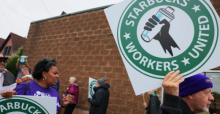
Notorious anti-union coffee giant Starbucks has won a major victory against both organized labor and press freedom. Trump-appointed federal Judge John Sinatra has ordered that Starbucks Workers United in Buffalo, New York, must hand over messages to reporters as the company attempts to fight union efforts in court (Washington Post, 10/29/22). New York’s shield law protecting journalists from disclosing sources doesn’t apply in this case, because the court is seeking the information from the union organizers, not the press, the Post explained.
Corporate legal action against a labor union can have multiple purposes. It intimidates organizers and distracts them from the real work of organizing. Discovery also allows companies to gain intelligence on how union campaigns operate, so they can hone their anti-union defensive methods.
Food service union organizers often prepare for the worst types of litigation strategies to be used against them—it isn’t uncommon for organizers to avoid talking about substantive strategies, or making any kind of accusation, in electronic communications. If these Starbucks worker organizers maintained discipline, Starbucks’ corporate lawyers might not learn very much.
But even so, this is a dangerous decision, largely because reporters can only operate freely if they know that their communications with confidential sources are secure. Decisions like this can scare journalists from the labor beat, where in an age of inflation and economic insecurity they are sorely needed. Media unions are alarmed. Deadline (10/31/22) reported that SAG-AFTRA and WGA East, which together represent thousands of broadcast and digital reporters, say they’re “deeply distressed” by the ruling.

Two unions issued a joint statement (Deadline, 10/31/22): “Allowing employers to subpoena communications between journalists and working people who seek a voice on the job, who exercise their right to engage in collective action, will inevitably chill the rights of both the journalists and the workers.”
Former New York Times correspondent Chris Hedges outlined in his book The Death of the Liberal Class that the only way liberal democracy can exist in a capitalist economy is if there are robust pillars of liberalism. Two of those pillars are organized labor and a free press.
Starbucks CEO Howard Schultz has a long history of anti-union animus (CNBC, 4/9/22; Guardian, 5/4/22; AP, 8/18/22), although that didn’t stop talk that he would have been Hillary Clinton’s secretary of labor had she won the 2016 presidential election (Seattle Times, 1/10/17). His failed attempt at a presidential run was propped up, barely, by fake Twitter accounts (NBC, 3/4/19), an example of how a corporate titan can benefit from misleading information on social media.
But traditional media propped him up in more insidious ways, as the Columbia Journalism Review (2/13/19) explained after CNN questioned his personal finances: “CNN does not deserve praise for grilling Schultz on his wealth when Schultz’s wealth is the only reason he was on CNN.” Or as political scientist Lee Drutman told Vox (2/13/19) at the time, “Schultz doesn’t have to do that hard work of building a mass movement” in order to gain steam in a presidential race, because “media uses ability spend money as a proxy for seriousness.” He is often dubbed a “genius” (Real Money, 1/25/13; WNYC, 8/18/16).
More recently, Bloomberg Law (6/14/22) reported that, according to Starbucks union officials, an interview with the New York Times (6/11/22) shows that Schultz “demonstrates the company won’t bargain in good faith with unionized employees”: “Schultz in the interview said Starbucks will never accept the union, and that unionizing will cause the company to lose business,” the union told Bloomberg, which noted, “Public comments like Schultz’s present a legal minefield, as the National Labor Relations Board has found executives’ statements alone to be labor law violations.”
Inspired by organizing

Starbucks CEO Howard Schultz claimed not to be anti-union (Businessweek, 5/12/22)—after talking about “companies throughout the country being assaulted, in many ways, by the threat of unionization.”
The waves of Starbucks union organizing across the country have encouraged other organizing campaigns (Businessweek, 5/12/22) in a time when corporate and conservative media focus on membership decline in the more established unions (The Hill, 1/20/22; City Journal, 4/27/22). Reporters like the Starbucks and Amazon organizing stories because they are juicy: They are man-bites-dog, David-versus-Goliath tales that can make the front page.
As San Francisco State University’s John Logan told FAIR’s CounterSpin (10/14/22), people are “taking inspiration from the union victories at Amazon and at Starbucks,” because “They’re thinking, ‘We should do that in our own workplace. We don’t just have to quit. We can stick around and organize, and try to win respect and dignity at work.’” (Incidentally, this trend includes American journalists—Nieman Reports, 1/19/22.)
Logan, noting that 71% of Americans support unions (Gallup, 8/30/22), added:
And that’s despite the organizational weakness of unions, despite the fact that unions only represent 6.1% in the private sector. The last time unions had that level of public approval was 1965, but unions represented almost 30% of the workforce back then.
And so we see it very clearly among young workers. Overwhelmingly young workers approve of unions. But they have really, really low rates of union membership, and that’s because young workers work overwhelmingly in what I would call young workplaces, places like Starbucks, places like REI, places like Trader Joe’s, and those workplaces are overwhelmingly non-union.
This judge’s order sends a message not only to the workers, but to reporters who are interested in talking to workers who are organizing: You are being watched. The order may well be overturned on appeal; “I keep rereading [the judge’s order] and saying, ‘This can’t be right,’” Cornell’s Cathy Creighton, a former labor lawyer, told the Washington Post. But Starbucks has shown that they are willing to go this route, and that they have at least a few pro-corporate friends on the bench willing to help.
By Ari Paul
